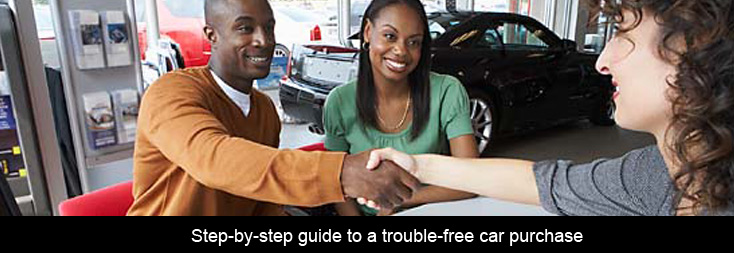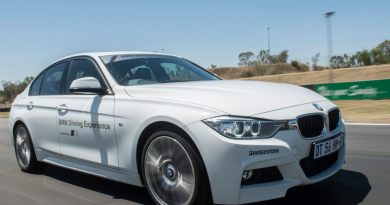Experts advise on a Step-by-step guide to a trouble-free car purchase

Next to your house, your biggest single purchase is likely to be your car. You go to great lengths to ensure that the path leading up to your purchase of a house is, as far as is humanly possible, devoid of pitfalls.
Somewhat surprisingly, many buyers of motor vehicles do not adopt the same procedures. Because it’s a really big-ticket item, you should not hesitate to treat a motor vehicle purchase with the same circumspection as you would the acquisition of a home.
We would like to share a very informative opinion piece by Trevor Browse, Managing Executive at MFC, a division of Nedbank, on what to keep in mind when purchasing a car:
Avoid the pitfalls when buying a Car
You go to great lengths to ensure that the path leading up to your purchase of a house is, as far as is humanly possible, devoid of pitfalls. Somewhat surprisingly, many buyers of motor vehicles do not adopt the same procedures.
Because it’s a really big-ticket item, you should not hesitate to treat a motor vehicle purchase with the same circumspection as you would the acquisition of a home.
In what follows, I offer a step-by-step guide to peaceful post-purchase nights.
After you have decided on the brand/make and type of vehicle you want to purchase, the most important decision is selecting the dealership you use for your purchase.
Ensure that the dealership is a member of either the Retail Motor Industry Association (RMI) or Independent Dealer Association (IDA). Both these associations have strict rules of accreditation and membership, code of conduct, compliance with legislation, etc – rules designed to protect your rights and interests.
The prospective pitfall here is that a dealership might disingenuously and dishonestly claim membership of one of these bodies. Therefore, insist on proof of membership while also checking that the dealership is approved with the major finance houses, as this will provide peace of mind and comfort that the banks are happy with the financial status of the dealership.
This relationship is normally governed by a legal agreement between the dealership and the financial institution.
Some dealerships have joint-venture finance arrangements backed by one or more of the major banks. Be careful when considering in-house finance not backed by the major banks.
Duties of the Sales person
The sales person is responsible for demonstrating the vehicle of your choice and for assisting you with all vehicle-related questions like technical aspects, the price, mileage, accessories, extras, guarantees, warranties, service plans, maintenance plans, etc, and advising which services are included in the deal and which are available as part of the finance package.
The sales person will prepare an offer to purchase, which you will need to sign. Special emphasis must be placed on obtaining clarity on each item listed and the relevant cost. Be on the lookout for excessive delivery/on-the-road, licence and registration fees.
Insist on test-driving a used vehicle in different types of traffic conditions. If you feel it is necessary, insist on an independent roadworthy test.
When buying a used vehicle, one must consider warranty, service and maintenance plans, which are offered by most reputable dealers.
Finance and Car Insurance Considerations
Be well aware that the finance and insurance (F&I) consultant can play a critical role in the car-buying process.
Ensure that the F&I is accredited in terms of the National Credit Act (NCA) to facilitate and assist with both your finance application and insurance/assurance requirements. Insist on a valid NCA agent card to be presented by the F&I before you proceed with the application and relevant documentation.
The card is proof that the F&I is accredited to provide financial advice. F&Is undergo compulsory training to ensure that you are correctly advised on the finance options available. They are also approved by the relevant banks to act on their behalf.
The F&I will also submit your application for finance to a bank of your choice on your behalf. Bear in mind that it is your right to choose the bank, just as it is your right to consent to where your personal information is sent.
The F&I will advise on the outcome of the application and applicable conditions. Besides knowing the dealership, your interrelationship with the F&I is probably the second most important step in the car acquisition process.
If your application is approved in terms of the NCA, the F&I must provide you with a written quote from the bank detailing:
• the amount approved;
• the deposit required;
• the contract term;
• the interest rate (look out for fixed- or linked-rates options);
• any fees and charges payable (the maximum initiation fee allowed by the NCA is R1 140, including VAT, and the maximum monthly service fee is R57, including VAT); and
• the total cost of credit over the term of the contract.
Check out whether or not there are any residual-value or balloon payments included in the finance structure. These are large once-off payments at the end of the term and they could have huge financial implications once the structure terminates.
Also, take your time in considering the quote, as this is normally valid for up to 30 days. Then, once you have accepted the quote, a finance agreement will be prepared by the bank for signature.
For you, the client, the following are important aspects of the vehicle purchasing procedure:
• A clean credit record is vital in obtaining finance. Besides the affordability check, any adverse reports/blacklisting and bad credit references will be taken into consideration and will have a negative impact on your application and the conditions of approval.
• A clean credit record will also allow you to negotiate better terms and interest rates.
• Proof of a valid driver’s licence will be required as part of the application process.
• Proof of comprehensive insurance will also be required and must be valid for the duration of the agreement. This is important to protect you against accidents, theft and total loss of the vehicle.
• Once the vehicle is ready for delivery, the finance agreement must be signed with the F&I, after which delivery can take place. This is probably the third most important step.
• Only when you are happy with the vehicle should you sign the relevant paperwork, authorisation and release for payment by the bank to the dealership. The bank is obliged to pay the dealership for the vehicle when the dealership has provided the bank with the contractually binding documentation.
• The duly signed documentation is confirmation to the bank that you, the client, were happy with the vehicle and the terms of business and took delivery of the vehicle.
• The signed delivery note, once in the dealership’s possession, is as good as cash. The bank cannot withhold payment to the dealership if the client has signed acknowledgement of acceptance and agreement.
• Check the finance agreement carefully, with special attention paid to:
the loan amount;
the deposit amount;
extras and accessories;
value-added products appended to the agreement;
the term of the contract;
the interest rate;
the monthly repayments;
debit order details;
payment due date; and
residual value – balloon payment structure.
Trevor Browse is Managing Executive of MFC, a Division of Nedbank



